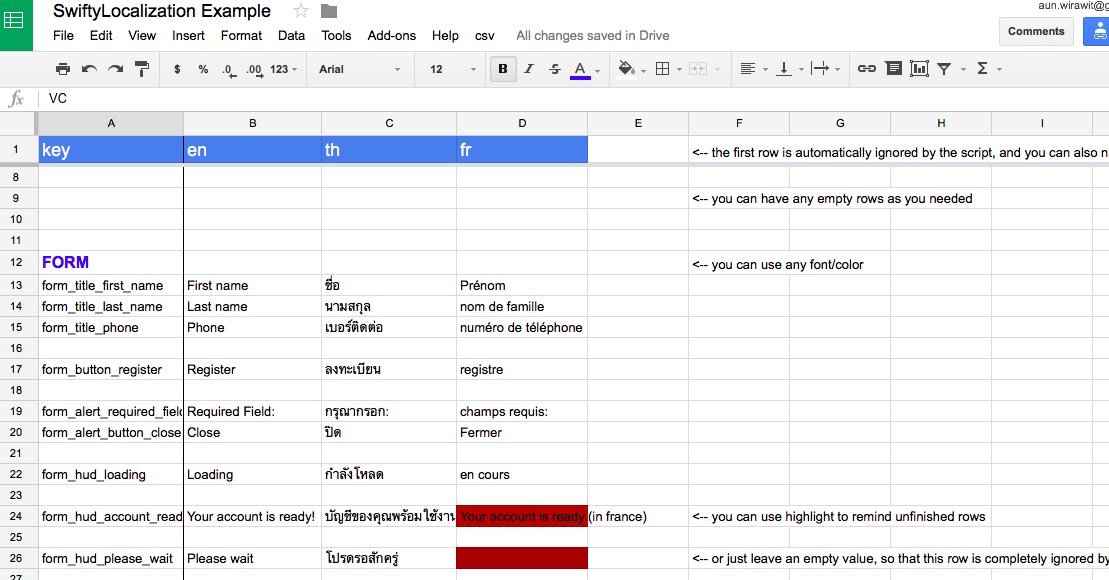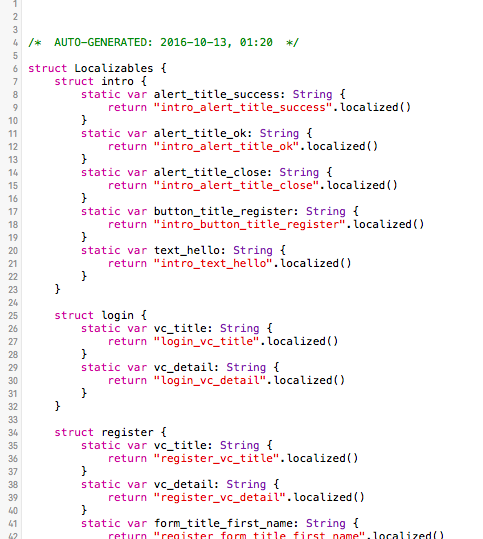A simple localization solution for iOS. Google Spreadsheets -> Localizable.strings -> Swift's struct.
Note: This project is quite old, it probably doesn't run out of the box (e.g., there will be bugs). You may use it just as an idea for a localization workflow. Or fork and fix it to suit your needs.
From Google Spreadsheet (Live here: example sheet):
Yes, no human deserves to make this struct themselves...
- Flexible localization with Google Spreadsheets - comment, color & fonts and much more
- Multiple Spreadsheets support - distinguish between pages/features/domains
- Generate Localizables.string - no more touching these files
- 🎉 Generate Localizables.swift - a struct that manages all keys, decode and return localized String. No more wrong keys out of nowhere, the compiler catches them for you!
For Android: - [x] Generate value-lang/strings.xml (not thoroughly tested yet) - [ ] Generate a counterpart of Localizables.swift - a helper to decode and return localized String.
- Edit Google Spreadsheets
- Spreadsheets -> csv files (Google App Script)
- csv files -> local csv files (Synced by Google Drive app, or manually download)
- local csv files -> Localizable.strings & Localizables.struct (Python script)
-
Edit Google Spreadsheets. Look at a guideline here.
-
Export them to csv files with Michael Derazon's Google script. A slightly modified version is included here (google_sheets_export_csv.txt). Just copy to script editor and run it. After this, a folder named 'csvFiles' will waiting in your Drive folder. It contains all csv files from all sheets (sheetname.csv). Change the code, e.g. for folder names, as you need.
-
(Optional) For quick development iteration:
- Sync 'csvFiles' with Google Drive app for mac. So that everytime you run script to export csv, 'csvFiles' will be available locally on your local Drive's folder.
- softlink (ln -s) your local Google Drive with:
ln -s {path-to-your-csvFiles-in-local-Drive} {anywhere-near-your-xcode-project}
So that your project has kind of shortcut to 'csvFiles'.
-
Get csvFiles (either by 3. or download manually from Google Drive).
-
Generate Localizable.strings & Localizables.swift.
Set your paths & how to decode a key to a localized string at settings.json. Then run this script:
python csv_localizer.py
Or you can just double-click on main.command (for mac), it will run this on terminal for you.
HOW IT WORKS
TL;DR: Take a look at /SampleOutput/struct/Localizables.swift. Then you may not need to know about this.
What the script do is that it will find input path to csvFiles (path/name from settings.json), then it aggregates every .csv files inside that folder recursively. Then it generates {lang}.lproj/Localizable.strings to your output path. It prepends each key with a sheet name, so {sheetname}_{key} is the actual key inside our string files.
The generated struct will be named Localizables.swift. Nested structs will have same name as sheet_name. Each has key as in your Spreadsheets. Each variable inside is a computed static var (so that everytime we get its value, it returns a localized string that reflects current in-app language). For the struct to work, you need to specify how to decode a localized string given a key in settings.json. For example, you can use NSLocalizedString. I use this great library to help manage in-app language setting. It has a String extension that allows me to use "key".localized() to return a string. I set ""{key}".localized()" in settings.json.
To use. Suppose you have a sheet named 'login' with a key 'button_title_register' inside, you can retrieve it like:
Localizables.login.button_title_register
- BASE_STRING_PATH: a base path
- IN_PATH: a folder of csv files, relative to the base path
- OUT_PATH: a folder to output localizables, relative to the base path
- PLATFORM: ios or android (android will generate strings.xml)
- LANG_KEYS: array of valid language codes. e.g. ["en", "fr", "th"]. It will be used as {lang}.lproj for ios, and values-{lang} for android.
- GEN_STRUCT_IF_IOS: whether to generate Localizables.swift or not (true or false)
- GEN_STRUCT_BASE_PATH: a base path for struct generation
- GEN_STRUCT_OUT_PATH: a folder to put a struct
- GEN_STRUCT_FILE_NAME: a name of struct file. e.g. Localizables.swift
- GEN_STRUCT_STRUCT_NAME: name of struct. e.g. Localizables
- GEN_STRUCT_VALUE_RETRIEVAL: specify a way to decode localized string from a key. E.g. if you have a function "key".localized() to get a value. You can set this field to ""{key}".localized()". Or use plain NSLocalizedString like "NSLocalizedString("{key}", tableName: nil, bunedle: bundle)"
- Format Google Spreadsheets as you like. As an idea, fill unfinished translation cell with red color. Add comments. Add border to visually group a set of related keys. Make some important keys with bigger fonts. Etc.
- No out-of-sync between different language files since we don't touch Localizable.strings anymore.
- Having struct as an interface to localized strings allows us to:
- Use autocomplete
- Xcode won't compile if there's a wrong key in the project.
😅 Phews! That looks complicated and feels like home-made solution. That's the nature any free solutions. But trust me, it's really worth the hassles. Imagine this, that moment when you add a new key-value in a spreadsheet, click export csvFiles. Wait for them to sync on your local folder. And double click on main.command to update all files & struct with the latest version. Boom, that new key is avaiable instantly through Xcode Autocomplete!
All suggestions/helps are welcome!

